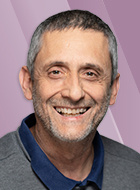
Location
Haifa, Israel
Term of office as Elected Council member
2021-2024 First Term
Itamar Ashkenazi is a physician at the Rambam Health Care Campus and a teacher at the Technion-Israel Institute of Technology’s medical school, Haifa, Israel. He studied medicine at the Hebrew University in Jerusalem. Life circumstances have led him to be involved in the clinical research of explosion injuries, emergency surgery, mass casualty events, and cancer surgery. Following fourteen years as an active member and six years as acting chairman of an institutional research ethics committee, author/co-author of medical publications, peer reviewer, academic editor, and recently, associate editor, Itamar has added academic integrity to his list of research areas of interest.
2023 competing interest statement for Itamar Ashkenazi (PDF)
Getting to know you
An interview with Itamar Ashkenazi
What is your current professional position?
Briefly, I am a physician. I work in a government hospital in Israel. I am also a teacher in the Technion-Israel Institute of Technology's medical school. I recently joined the Rambam Maimonides Medical Journal as an associate editor. It is a peer-reviewed, open-access medical journal that carries no publication fees. What is unique about working there is that we actively guide and help the authors revise their manuscripts to improve their final paper when needed. I also handle submissions as an academic editor for PLOS One.
What kinds of work have you been involved in to lead you to your position on COPE Council?
Throughout my academic work I have experienced many different issues surrounding research and publication ethics, whether as a researcher, author of scientific manuscripts, member of a research ethics committee, acting chairman of that committee, reviewer for multiple journals, and handling editor. I have witnessed ethical misconduct and the indifference of the academic institutions involved that prefer industrial peace over and above the problem of unethical behaviour. I hope through COPE to increase the involvement of the academic establishment in upholding ethical standards.
What are the most common publishing ethics issues you and your colleagues have faced?
Quantity vs. quality, I think, is the source of all evil, and seems to be a worldwide phenomenon. We are judged by how many papers we publish, not their quality; by how often we appear in the important first or last positions of the author byline, not our real contributions. And I want to make sure that I am not misunderstood - by quality, I do not mean the impact factor of the journal's publication of the manuscript.
What has been the most complicated, or difficult, ethical issue that you have resolved?
I have had the opportunity of dealing with several ethics cases. In those few that I also had the chance to dig in more deeply, I found it never ended with one problem. Honorific authorship, for example, is very common. However, many times it goes together with the deprivation of deserving authors. At times, one should not be surprised if honorific authorship is associated with plagiarism, salami publication, and even falsification of results. So to answer your question, it is the academic culture that is the most complex to resolve.
Are there any ethics issues which are unique or more common in your field, or country?
There are ethical issues that seem more common in my field of medicine. I am an academic physician. In other words, I have two different jobs. As a clinician, I have a full-time job taking care of patients in a busy clinic, with hospitalised patients, emergency consultations, and operations to tend to. In most other academic fields, the division of time between research and other responsibilities is the opposite. A significant part of the time is dedicated to research and its publication, if not most of it. I do my research during my free time, at nights and weekends. To further the absurdity, clinical research is considered by the universities to be of inferior quality compared to other scientific areas. Thus, in medicine, we are demanded to produce more publications to achieve the same academic rank. It should not be surprising if ethical misconduct is more common in clinical medicine compared to other fields.
What tools would enhance awareness of good ethical conduct?
We need to create standards that make sense and will not be too difficult to follow. We need to create a culture that cultivates these standards and promotes cooperation rather than coercion. COPE has an essential role in fostering this culture through education. However, COPE, the editors, and publishers cannot fight ethical misconduct, we need the academic institutions to do that for us.
Are there any COPE projects in particular you would like to get involved in, or any initiatives you have in mind?
COPE members have already produced an immense number of excellent products such as guidelines and flowcharts. Many of these are being updated, and new guidelines are being produced. I would be more than happy to be involved with anything that will promote academic integrity by improving the academic publication culture. Now that universities seek to become COPE members, it is an opportunity to promote healthy standards. We need to figure out how this can be accomplished.
Photo copyright Philippa Gedge Photography